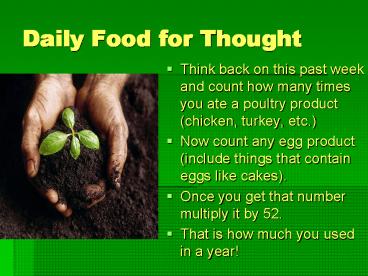Daily Food for Thought
1 / 18
Title: Daily Food for Thought
1
Daily Food for Thought
- Think back on this past week and count how many
times you ate a poultry product (chicken, turkey,
etc.) - Now count any egg product (include things that
contain eggs like cakes). - Once you get that number multiply it by 52.
- That is how much you used in a year!
2
Poultry in Our Life
- Learning Targets
- I can identify the different products that come
from poultry used in daily life. - I can evaluate the impact poultry has on the
lifestyles and economy of the United States.
3
What do we use poultry for?
Thanksgiving Turkey
Eggs- Angel Food Cake
Chicken Nuggets
Feathers-Fish lures
Feathers-Down pillows
Eggs-Medicine
4
What types of poultry are there?
Ducks
5
Pigeons Are Also Poultry There is a hobby called
Pigeon Racing and hobbyists take it very
seriously!
6
Ratites Are Sometimes Considered Poultry
Emus are known for emu oil, meat, feathers,
eggs (food, collectibles) and leather.
Ostriches are raised for meat, feathers, eggs
(food, collectibles) and leather.
7
Chickens
- Chickens make up the largest sector of the
poultry industry. - Consumption of chicken in the U.S. is rising
every year.
- Why?
- Chicken is LOW in fat, HIGH in protein and LOW in
cholesterol when compared to meats such as pork
and beef. - There are several breeds of chicken used to
produce different products and types of eggs.
8
Trends
- The poultry industry in the U.S. started on
family farms in the Midwest where grain
production was concentrated. - The Southeast gained a competitive edge in the
poultry industry because of the mild climate and
vast pool of labor in that region.
9
Trends
- Growth of the poultry industry is predicted to
increase at a rate of 2 to 3 percent a year. - Broilers are now the number one meat by volume
sold in the United States.
10
Trends
- Although per capita egg consumption has decreased
since 1944, total egg consumption has remained
steady.
11
Trends
- The turkey industry has changed from a bird
production industry to a meat industry and is
much more extensively turning the whole carcass
into specialized meat products. - Boneless roasts, Sausage, Ham, Ground meat,
Bologna, Hot dogs, Smoked meats.
12
Poultry Terms to Know
Broiler- used mainly for meat. A broiler is a
chicken is 6 to 7 weeks of age and weighs 4
pounds when it is sent to market.
Layer-a mature female chicken that produces eggs.
Most can lay 300 eggs/year.
Pullet- a young female chicken
13
Poultry Terms to Know
Capon- a male chicken that has been
neutered/castrated, usually 5 to 7 months of age
and weigh about 6 pounds. By castrating these
males when they are 3 weeks old, their meat is
more tender and more flavorful when the bird
matures.
Rooster/Cock- a mature male chicken
Cockerel- a male chicken that is less than 1 year
old
Spent hen- a hen that is no longer laying
14
Poultry Terms to Know
Photos courtesy of USDA
1. Hatchery
Vertical Integration-raising, processing, and
distributing poultry is now one continuous chain.
A large company is composed of smaller companies
that carry out all the processes from
manufacturing to distributing. For example, Con
Agra is one large company, but they hire growers,
hatcheries, distributors, and processors.
2. Growout
3. Processing
4. Distribution
15
Economic Advantages
- The poultry industry provides for a quick
turnover of capital. - Poultry markets are standardized and well
established. - Poultry production may be a full time or part
time occupation.
16
Career Opportunities
- Production- Broilers, Eggs, Turkeys, Hatching
eggs, Started-ready to lay pullets. - Equipment Suppliers
- Hatcheries
- Feed Manufacturers
- Processing Plants
17
Career Opportunities
- Packaging Plants
- Veterinary Care
- Transporters
18
Reflection
- List three reasons that the poultry industry is a
good career field. Include economic and lifestyle
reasons.































